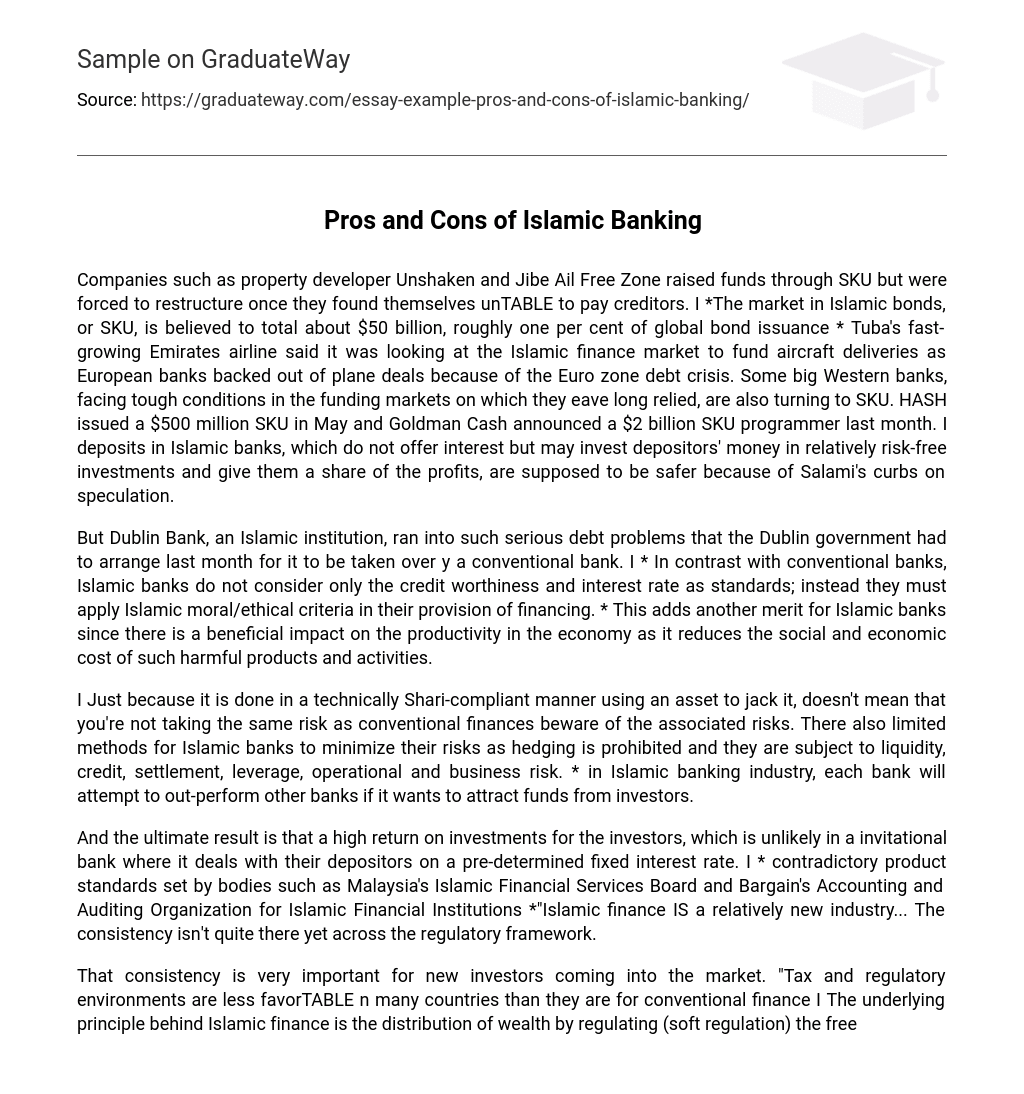Companies such as property developer Unshaken and Jibe Ail Free Zone raised funds through SKU but were forced to restructure once they found themselves unTABLE to pay creditors. I *The market in Islamic bonds, or SKU, is believed to total about $50 billion, roughly one per cent of global bond issuance * Tuba’s fast-growing Emirates airline said it was looking at the Islamic finance market to fund aircraft deliveries as European banks backed out of plane deals because of the Euro zone debt crisis. Some big Western banks, facing tough conditions in the funding markets on which they eave long relied, are also turning to SKU. HASH issued a $500 million SKU in May and Goldman Cash announced a $2 billion SKU programmer last month. I deposits in Islamic banks, which do not offer interest but may invest depositors’ money in relatively risk-free investments and give them a share of the profits, are supposed to be safer because of Salami’s curbs on speculation.
But Dublin Bank, an Islamic institution, ran into such serious debt problems that the Dublin government had to arrange last month for it to be taken over y a conventional bank. I * In contrast with conventional banks, Islamic banks do not consider only the credit worthiness and interest rate as standards; instead they must apply Islamic moral/ethical criteria in their provision of financing. * This adds another merit for Islamic banks since there is a beneficial impact on the productivity in the economy as it reduces the social and economic cost of such harmful products and activities.
I Just because it is done in a technically Shari-compliant manner using an asset to jack it, doesn’t mean that you’re not taking the same risk as conventional finances beware of the associated risks. There also limited methods for Islamic banks to minimize their risks as hedging is prohibited and they are subject to liquidity, credit, settlement, leverage, operational and business risk. * in Islamic banking industry, each bank will attempt to out-perform other banks if it wants to attract funds from investors.
And the ultimate result is that a high return on investments for the investors, which is unlikely in a invitational bank where it deals with their depositors on a pre-determined fixed interest rate. I * contradictory product standards set by bodies such as Malaysia’s Islamic Financial Services Board and Bargain’s Accounting and Auditing Organization for Islamic Financial Institutions *”Islamic finance IS a relatively new industry… The consistency isn’t quite there yet across the regulatory framework.
That consistency is very important for new investors coming into the market. “Tax and regulatory environments are less favorTABLE n many countries than they are for conventional finance I The underlying principle behind Islamic finance is the distribution of wealth by regulating (soft regulation) the free activities of the market for the collective benefit of the society. Islam believes in free trade and creation of wealth and true private ownership as the means of production.
The advantages of Islamic finance are summarized as;a) no speculative trading,b) reduced uncertainty,c) no excessive leverage,d) no excessive profiteering (reasonTABLE mark-ups)e) ensuring equal bargaining power of the parties. The establishment of an Islamic money market fund in the UK has attracted greater flow of capital from investors in the Middle East and other Muslim countries. Investment in Shari-compliant products does not mean that the investor is insulated from commercial risks.
In fact there may be more risk associated with Islamic methods of financing as with conventional banking. The disadvantages of Shari-compliant instruments can be summarized as follow;a) there are limited enabling legislation,b) restrictions on foreign ownership of assets and enterprises,c) limited enabling infrastructure like Special purpose Vehicle (SSP) and trust are being permitted and methods for setting these up or allowing them to cross borders. ) no global consensus on Shari. There is no international consensus on Shari interpretations, especially in relation to innovative products) no standard Shari model, drafting documents for the Islamic finance market are tailor-made for individual transactions, leading to much higher transaction costs than conventional finance alternatives.





